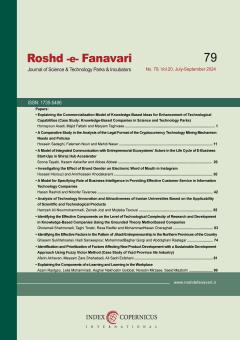Identifying the effective factors in the pattern of jihadi entrepreneurship in the northern provinces of the country
Subject Areas : كارآفريني و مديريت شركتهاي دانش بنيانGhasem Sukhtehsaraii 1 , Hadi Sanaeepour 2 , Mohammad Bagher Gorji 3 , Abdol gane Rastgar 4
1 - Department of Entrepreneurship, Aliabad Katul branch, Islamic Azad University, Aliabad Katul, Iran.
2 - Department of Management, Azadshahr Faculty of Humanities, Gonbadgavos University, Gonbadgavos, Iran
3 - Department of Entrepreneurship, Aliabad Katul branch, Islamic Azad University, Aliabad Katul, Iran
4 - Department of Management, Azadshahr Faculty of Humanities, Gonbadgavos University, Gonbadgavos, Iran.
Keywords: Jihadi entrepreneurship model, social entrepreneurship, entrepreneurial spirit, value creation, jihadi work culture, foundation data method,
Abstract :
The purpose of this research is to identify the effective factors in the pattern of jihadi entrepreneurship in the northern provinces of the country. The current research is a type of qualitative research, in which the model of jihadi entrepreneurship in the northern provinces of the country has been designed by using research methods with a focus on deep and semi-structured interviews. For this purpose, several steps have been taken. In the first stage, concepts were extracted by using the theoretical foundations, research background, as well as by using the foundation data method, in-depth and semi-structured interviews and soliciting opinions from selected experts. In this research, 20 experts from the industry sector in the field of jihadi entrepreneurship and people who had experience in jihadi entrepreneurship and research participated. It should be noted that with 16 interviews, theoretical saturation was achieved and no new data was added to the previous data, but the process of conducting interviews continued until 20 interviews. The identification of research components was done using the foundation data method, i.e. open, axial and selective coding. In the qualitative part, the decision-making team included professors and experts, key informants, jihadi entrepreneurs in the industrial sector identified in the northern provinces of the country, and experts on this issue in support institutions, including the aid committee. Identification of people was done in a targeted way. The result of this step was to identify the main and sub-components and dimensions of the jihadi entrepreneurship model design in the northern provinces of the country, and in total, 139 coders were identified; 39 core codes and 10 selective codes resulted.
